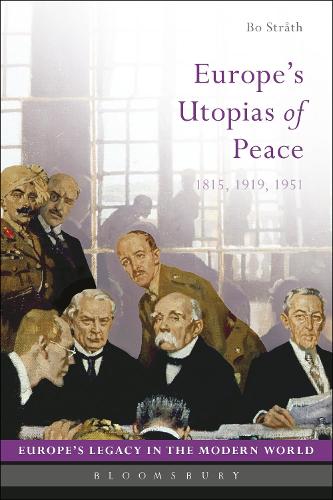
Europe's Utopias of Peace: 1815, 1919, 1951
(Hardback)
Available Formats
Publishing Details
Europe's Utopias of Peace: 1815, 1919, 1951
By (Author) Bo Strth
Bloomsbury Publishing PLC
Bloomsbury Academic
28th January 2016
United Kingdom
Classifications
Professional and Scholarly
Non Fiction
Peace studies and conflict resolution
940.28
Physical Properties
Hardback
552
Width 156mm, Height 234mm
948g
Description
Europes Utopias of Peace explores attempts to create a lasting European peace in the aftermath of the Napoleonic wars and the two world wars. The book charts the 250 year cycle of violent European conflicts followed by new utopian formulations for peace. The utopian illusion was that future was predictable and rules could prescribe behaviour in conflicts to come. Bo Strth examines the reiterative bicentenary cycle since 1815, where each new postwar period built on a design for a project for European unification. He sets out the key historical events and the continuous struggle with nationalism, linking them to legal, political and economic thought. Biographical sketches of the most prominent thinkers and actors provide the human element to this narrative. Europes Utopias of Peace presents a new perspective on the ideological, legal, economic and intellectual conditions that shaped Europe since the 19th century and presents this in a global context. It challenges the conventional narrative on Europes past as a progressive enlightenment heritage, highlighting the ambiguities of the legacies that pervade the institutional structures of contemporary Europe. Its long-term historical perspective will be invaluable for students of contemporary Europe or modern European history.
Reviews
The book impresses with an amazing literacy, a masterful overview of the current status of research and committed commentaries. * H-Soz-Kult (Bloomsbury translation) *
This is a major and wide-ranging history of Europe from the Congress of Vienna in 1815 through the Versailles Treaty of 1919 to the Schumann Plan of 1950. Strath masterfully reconstructs the history of Europe around how these utopias of peace sought to overcome the legacy of war. It is a significant study that shows how the post-second world project of European integration must be understood in the context of modern European history since the French Revolution. He shows with great acumen how new designs for political economy emerged around plans for international peace. * Gerard Delanty, Professor of Sociology, University of Sussex, UK *
Strths detailed and well-documented book argues a strong case By isolating the concept of utopia, giving it thorough attention, and describing its evolution, Strth has made a significant contribution to the historical literature on peace. * Journal of Modern History *
Author Bio
Bo Strth is Professor Emeritus at the University of Helsinki, Finland. He has written widely on conceptual history and the history of European integration. His recent publications include States and Citizens: History, Theory and Prospects (2003), The Political History of European Integration (2010) and A European Memory Contested Histories and Politics of Remembrance (2013).
